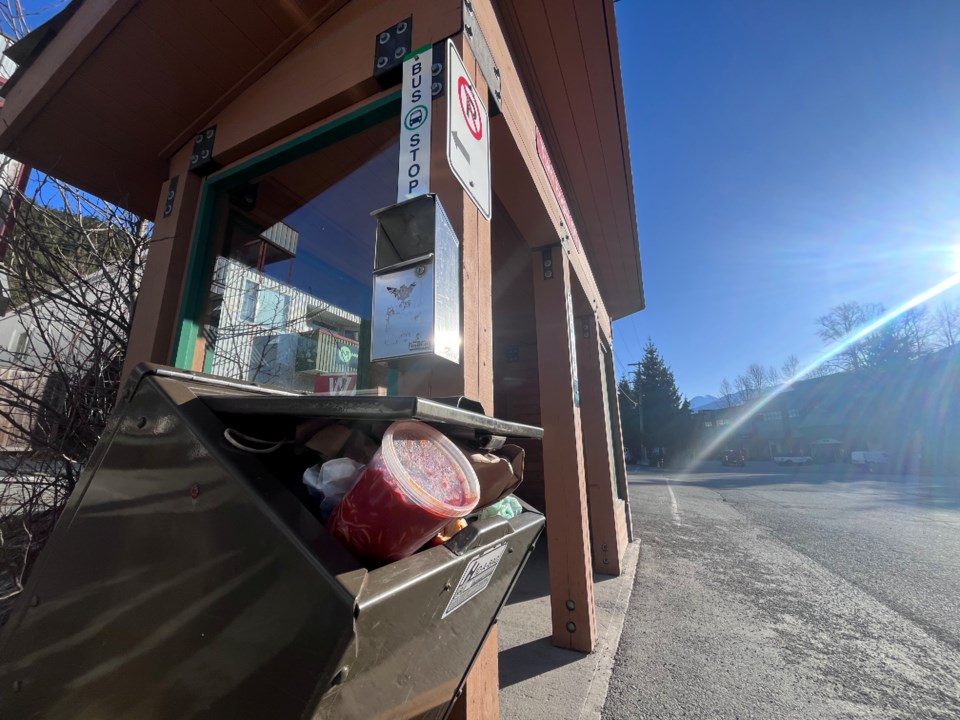Whistler’s mayor and council heard an update on the Resort Municipality of Whistler’s (RMOW) zero-waste goal last month, and the numbers are not as squeaky clean as hoped.
According to a staff report to council, Whistler generated 11,561 tonnes of waste in 2023—an increase of 129 tonnes from 2022.
In the larger scheme of things, a small change—but in entirely the wrong direction considering the municipality’s self-imposed goal is to reduce landfill waste by 80 per cent from 2019 levels by 2030, to 2,368 tonnes annually.
Speaking to the report at the April 23 regular council meeting, the RMOW’s solid waste technician, Lauren Harrison, said the path to zero waste is not just through minimizing the impact of landfills, but with behavioural changes as well.
“Extracting raw resources requires a large amount of energy and creates pollution. Processing these materials then requires more energy and creates more pollution. And then once they’re used, materials are simply dumped in landfill,” she said,
“In contrast, a zero-waste approach conserves natural resources and reduces pollution and greenhouse gases from all of those steps.”
Harrison reported while the tonnage delivered to landfill has increased, the rise coincides with a hefty population increase, which means Whistler’s per-capita waste generation actually went down.
“The goal of 80 per cent of 2019 levels is 2,368 tonnes disposed of in 2030, so we clearly still have a very, very long way to go, but we are moving in the correct direction, which is reassuring to see,” she said.
In fact, Whistler came in below the province’s waste goals on a per-person level, which is 350kg per person, per year.
“We did meet this in 2023 … we generated 304kg of waste per person,” said Harrison, adding the most recent provincial data for the whole of B.C. showed an average of 506kg per person, per year, while in the Squamish-Lillooet Regional District, the overall average was 440kg—meaning Whistler is actually helping drag down the average in the region.
Since the RMOW’s current zero-waste plan was endorsed in 2021, the amount of waste generated in the community has continued to inch upwards from 11,000 tonnes, while the per-capita amount goes down, from 368kg per person, per year in 2021.
Harrison also spoke at length about diversion rates—the amount of waste going into recycling or composting streams rather than the landfill. In 2023, the diversion rate was 47 per cent—the same as in 2022.
Harrison noted Whistler’s diversion rate has been 40 per cent or higher since 2015.
“The best way we can increase our diversion rate is to get more organics out of the landfill and into our compost stream,” she said.
On that, the RMOW hired a contractor to do an audit of the Nesters and Function Junction Waste Depots in April 2023, with self-hauled residential waste considered. The data showed disposable organics had the most potential for increased diversion in Whistler, with organics accounting for more than 31 per cent of waste generated by weight, of which the vast majority was made up of avoidable food waste.
According to the staff report, the 2023 audit found 67 per cent of all materials audited had the potential to be diverted into composting, recycling, and product-stewardship depots (such as the Whistler Community Services Society’s Re-Use-It Centre).
“This means that over half of the waste that is currently going to the landfill could be diverted to more sustainable solutions,” reads the report.
However, as noted in the report and highlighted by Harrison in her presentation, even if 100 per cent of those divertible, audited materials were caught, the community would still not meet its 80-per-cent waste reduction goal given the relatively small amount of waste self-hauled to the waste depots (13.44 per cent of the community total).
“This is why achieving zero waste is not just about recycling and composting, also reducing and reusing—we really need a culture shift in our consumption habits,” Harrison said.
Notably, the report touched on alternatives to single-use items, with some discussion on the possibility of a reusable coffee cup program in Whistler which is being considered by municipal staff.
Councillors asked a run of questions around the particulars of the report, with Councillor Ralph Forsyth noting his disappointment on what the audit found, and asking what policy levers the RMOW could pull to ensure the community is on the right track for waste reduction.
Harrison said change may need to come at a provincial level to manage waste, and repeated behavioural shifts are key.
In speaking to the final report, Coun. Arthur De Jong said he was both frustrated and hopeful.
“When I look at the six Big Moves, each one of them needs technological and behavioural change for the most part. This is the one where if we had the will, we can get the ball close to the finish line,” he said.
“I’m airing a bit of frustration, but in the age of the Anthropocene where humanity is crashing the natural systems that give us life, we just fail to fully commit to something we can actually do today.
“I think of microplastics in our food chains and forgive me for my crudeness, but somehow we keep crapping in our nest, and we can do better,” he said.
Coun. Cathy Jewett spoke about the changes that have taken place over her lifetime, noting she grew up with paper bags and glass bottles—all of which seem to have shifted to plastics.
“We really have to move beyond plastic, we have to refuse plastic and find a way to not use it,” she said.
Councillors voted unanimously to receive the report.




